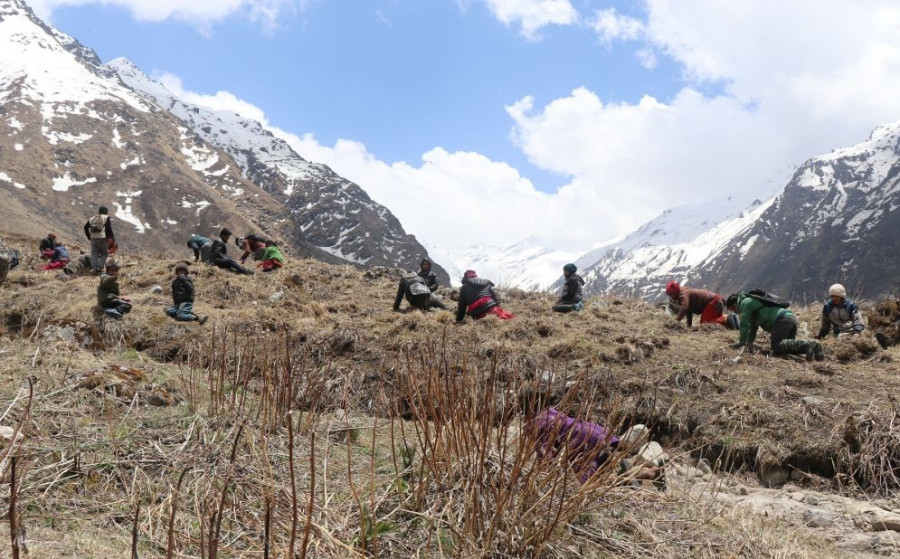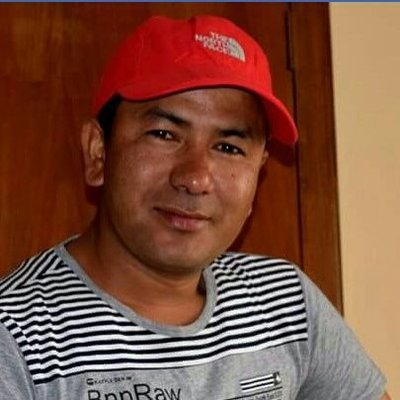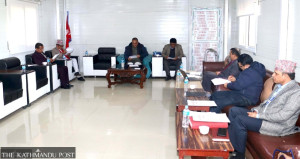Sudurpaschim Province
Hundreds of collectors climb highlands despite ban in yarsagumba collection this season
In mid-April, the Covid-19 Crisis Management Committee in Bajhang had decided to impose a ban on the collection of the herb because of the coronavirus pandemic.
Basant Pratap Singh
Hundreds of yarsagumba collectors have reached the highlands of Bajhang district to collect the caterpillar fungus (Cordyceps sinensis) despite the ban imposed by the government on this year’s collection.
In mid-April, the Covid-19 Crisis Management Committee in the district had decided to impose a ban on the collection of the herb this season in view of the coronavirus pandemic. However, despite the ban, most villagers in Saipal and Surma rural municipalities have left for the highlands to collect the medicinal herb also known as the Himalayan Viagra.
The collectors in Bajhang have started climbing up the highlands since the second week of June. Lakhan Bohara, a resident in Surma, said hundreds of yarsa collectors have reached the highlands of Surma and Saipal rural municipalities in the district to collect the herb.
Yarsagumba is harvested before the monsoon season, between May and June, when tens of thousands of people swarm over the Himalayan foothills in Rukum, Dolpa and Bajhang districts in western Nepal to collect the herb. Yarsagumba is found at elevations between 3,000 and 5,000 metres and is the world’s most expensive medicinal fungus. It can fetch as much as $100 per gram in the Chinese market, making it more expensive than gold, according to reports. The herb is used to cure anaemia, chest and lung infections, tuberculosis, Hepatitis B and kidney and liver diseases.
Yarsagumba is the main source of income for many families in Bajhang. Every year, transactions worth around Rs 400 million take place through the business of yarsagumba in the district.
“The main source of income for the people of Surma and Saipal rural municipalities is yarsagumba. The people could face a shortage of food and essentials in the coming season if they are unable to collect the herb this year,” said Dan Bahadur Surmeli, chairman of the Bajhang Chamber of Commerce and Industry.
After the district administration imposed a ban on yarsagumba collection, locals of Jayprithvi, Bungal, Chhabis Pathibhera, Surma, Saipal and Masta had raised their voices against the decision.
“We will die of hunger if we don’t collect yarsa this season,” said Ganesh Bohara, a yarsa collector from the district. “We are defying the ban to go pick the herb because if we don’t then we will have nothing to eat next year. We will take the risk of going to prison.”
Puskal Bohara, spokesperson at Surma Rural Municipality, said that the municipal office decided to open the highlands to the public after hundreds of collectors started climbing the high pastures of the Himalayas to collect yarsagumba.
“On Thursday, we decided to open the highlands for herb collection. More than 2,000 collectors had already reached the highlands by then,” Bohara said.
Likewise, Rajendra Dhami, chairman of Saipal Rural Municipality, said, “We had requested the villagers not to climb the highlands to collect yarsagumba this season. But they are adamant. They start out in large numbers and we can’t stop them.”
A few days ago, the Division Forest Office in Bajhang had issued a notice to the Ministry of Industry, Forest, Environment and Tourism in Sudurpaschim Province to inform them of the situation.
“We have asked the ministry to advise us on how to deal with the current situation. The lockdown has been eased but we don’t know whether we should allow collectors to pick yarsa or not. We will wait for the ministry’s suggestion,” said Karna Bahadur Khati, chief at the office.
Chief District Officer of Bajhang Kamalraj Bhandari, however, said that his office will take action against those who defy government decisions.
“We have been requesting the herb collectors who have reached the highlands to return to their villages. If they do not comply, we will take action on the basis of the prevalent legal system of the country,” said Bhandari, adding that he has been discussing with the forest secretary of the provincial government to take the necessary steps.
Meanwhile, in Mugu, Mugamkarmarong Rural Municipality has decided not to open the highlands for yarsagumba collection this season. Tsering Kyi Apne Lama, chairman of the rural municipality said, “The rural municipal office has decided to fine Rs 10,000 to an individual if found picking yarsagumba this season. We hope this move will deter the villagers from going to the highlands and will prevent the spread of the virus in the highlands.”
Raj Bahadur Shahi in Mugu contributed reporting.




 20.12°C Kathmandu
20.12°C Kathmandu















